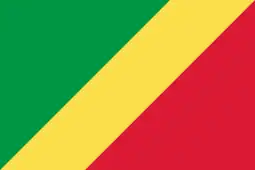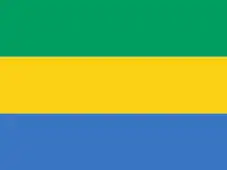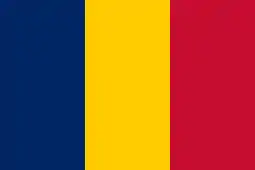| 2003 CAR coup d'état | |||||||
|---|---|---|---|---|---|---|---|
| |||||||
| Belligerents | |||||||
|
Alleged support: | |||||||
| Commanders and leaders | |||||||
|
Gen. François Bozizé[1] Abakar Sabone | President Ange-Félix Patassé[1] | ||||||
| Units involved | |||||||
| Unknown | Central African Armed Forces[1] | ||||||
| Strength | |||||||
| 1,000[1] |
| ||||||
| Casualties and losses | |||||||
| Unknown |
| ||||||
A coup d'état occurred in March 2003 in the Central African Republic when the forces of General François Bozizé marched on Bangui, the country's capital, while President Ange-Félix Patassé was attending a regional Community of Sahel–Saharan States leaders' summit in Niger.[3]
Background
On 25 October 2002 forces local to Bozize invaded Bangui. They withdrew after six days of fighting.[4] On 27 November 2002 armed forces recaptured Bossembele killing five rebels and reopening road to Bouar.[5] On 7 December armed forces recaptured Damara from rebels.[6] On 20 December armed forces recaptured Bozoum. On 14 January 2003 Bouar was reportedly under rebels control.[7]
Coup
On Thursday, 13 March 2003, President Ange-Félix Patassé left Bangui to attend a regional Community of Sahel–Saharan States (CEN-SAD) summit in Niamey, Niger.[3] He was accompanied by a delegation of approximately twenty people, including First Lady Angèle Patassé, Foreign Minister Martial Beti Marace, and presidential advisor Prosper Ndouba, who had recently been freed from rebel captivity just two months before.[3] The presidential delegation flew from Bangui to Niamey onboard a Libyan Douglas DC-8, which had been loaned to Patassé by Libyan leader Muammar Gaddafi for use on this trip.[3] Before his departure, the president's Chief of Staff, Colonel Antoine Gambi, assured Patassé that François Bozizé's were contained to the north of the country and were not a threat to Bangui during the trip.[3]
While Patassé was away, Bozizé led 1,000 fighters towards the capital city of Bangui. On Friday, 14 March 2003, the rebels captured the towns of Bossembélé and Bouali, where President Patassé owned a small farm, enroute to Bangui.[3] Meanwhile, at the same time that rebels were marching on Bangui, President Patassé was in Niamey meeting with Muammar Gaddafi and Chad President Idriss Déby.[3] Déby would later be accused on supporting Bozizé's coup while Patassé was at the summit in Niger.[3]
Bozizé and his rebels entered Bangui on 15 March 2003, while President Patassé was still out of the country.[3] They captured the international airport and the presidential palace. Government troops, many of whom had not been paid in months, put up little resistance. The 370 CEMAC peacekeepers abandoned their posts rather than fight.
President Ange-Félix Patassé and his delegation had also intended to return to the Central African Republic on March 15, the same day that the rebels were seizing Bangui.[3] However, the flight carrying President Patassé back to Bangui was delayed from taking off from Niger because First Lady Angèle Patassé was running late from a shopping trip in Niamey.[3] While no one onboard the presidential plane was aware of the ongoing coup at the time, the first lady's lengthy Niamey shopping trip "probably saved the couple's life," according to journalist François Soudan in Jeune Afrique.[3] Bozizé and his rebels occupied Bangui M'Poko International Airport just as Patassé's delayed aircraft was on approach to the airport.[3] Had they attempted to land any sooner, Patassé and his presidential entourage likely would have been captured or shot down.[3] Rebels shot at Patassé's plane as it approached Bangui, forcing the plane to divert to Yaoundé Nsimalen International Airport outside Yaoundé, Cameroon.[3] The deposed presidential delegation was taken to the Yaoundé Hilton Hotel, where Angèle and Ange-Félix Patassé learned that their two young children, Salomon and Providence, had been taken to safety at the French embassy in Bangui.[3] The children were soon evacuated by a Transall C-160 military transport aircraft to Libreville, Gabon, with other members of the Patassé family and their Togolese servants.[3]
Militants from Chad were spotted among the rebel fighters, but the President of Chad, Idriss Déby, denied providing any military support to Bozizé. At least fifteen people were killed.[1][2]
A curfew was imposed afterwards by Bozizé and the constitution was suspended. On Sunday, March 16, 2003, one day after taking power, François Bozizé proclaims himself president of the Central African Republic.[3] France deployed a number of troops to the country for the first time in four years in order to protect foreign nationals.[8] After the coup, Bozizé created a new division in the Central African Armed Forces, made up of "patriots" who took part in the coup with him, called the Republican Guard. They committed numerous crimes against civilians in the capital.[9]
By Monday, March 17, 2003, international African support for Ange-Félix Patassé had faded.[3] Cameroon President Paul Biya had refused to call or acknowledge Patassé, though First Lady of Cameroon Chantal Biya met with her former counterpart, Angèle Patassé, and sent the family African food as part of her condolences over the coup.[3] Gabonese President Omar Bongo backpaddled from his initial support for French intervention in the Central African Republic, which Patassé calls "a betrayal."[3] Patassé openly accused Chad President Idriss Déby, whom he had met with in Niamey days before the coup, of supporting Bozizé, as Chadian forces and other groups were reportedly looting parts of Bangui.[3]
On Tuesday, March 18, 2003, two Cameroonian officials, Minister of State for Territorial Administration Hamidou Marafa Yaya and Secretary General of the Presidency Jean-Marie Atangana Mebarao met with Patassé and told him to leave Cameroon within 48 hours.[3] Cameroon President Paul Biya flew to the United States the next day having never called or met with Patassé.[3]
Patassé considered going to South Africa or Libya, before settling on Togo, where he had spent previously time in exile during the 1980s and met his Togolese second wife, Angèle Patassé.[3] Togolese President Gnassingbé Eyadema welcomed the Patassés to the country.[3] Mali President Amadou Toumani Touré and Senegalese President Abdoulaye Wade also offered invitations for Patassé to go to their countries.[3]
The Patassé family flew from Yaoundé to Lomé, Togo, on March 19, 2003, to begin their exile from the Central African Republic.[3]
International response
 Republic of the Congo and
Republic of the Congo and  Gabon: Foreign ministers of the two countries visited General Bozizé after the coup, saying that they would negotiate with him.[2]
Gabon: Foreign ministers of the two countries visited General Bozizé after the coup, saying that they would negotiate with him.[2] Chad: The President of Chad, Idriss Déby, denied allegations that Chadian troops helped Bozizé.[1]
Chad: The President of Chad, Idriss Déby, denied allegations that Chadian troops helped Bozizé.[1]
See also
References
- 1 2 3 4 5 6 7 CAR coup strongly condemned BBC News Africa. 17 March 2003.
- 1 2 3 "CAR: A popular coup", The Economist, 20 March 2003.
- 1 2 3 4 5 6 7 8 9 10 11 12 13 14 15 16 17 18 19 20 21 22 23 24 25 26 27 28 Soudan, François (2003-03-25). "La chute de l'Ange". Jeune Afrique. Archived from the original on 2023-05-27. Retrieved 2023-08-28.
- ↑ Calm returns to Bangui as rebels retreat, 31 October 2022
- ↑ Central African Republic: Rebels routed from northern city, 27 November 2022
- ↑ Central Africa Republic: Chronology of 2002
- ↑ Central African Republic: Government sends reinforcements to Bozoum, 16 January 2003
- ↑ Central African Republic: Mutinies, Civil Wars and a Coup, 1993—2003
- ↑ – UNDP: Fiche Pays: République centrafricaine (2005)